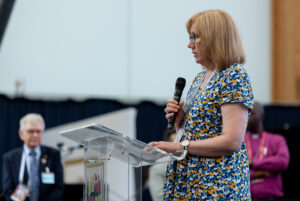Over the weekend, the Bishops began the process of discussing the Lambeth Calls, and joined Bishops and Spouses from across the Anglican Communion for the Conference’s opening act of worship.
Bishop John Armes (Edinburgh) wrote movingly of the opening worship, saying: “I shed plenty of tears during the Conference Opening Service on Sunday morning. It was partly the sheer big-ness of the event – so many people, such amazing music and such diversity. This gathering would have been unimaginable to those few, very Victorian bishops who gathered at the first Lambeth Conference. And I daresay they might have huffed and puffed at the ethnic variety, multiple languages and, of course, all those women. Although, if some time machine could have transported them to 2022 perhaps they might have begun to feel just a tinge of pride at how things have turned out. God is still glorified amongst us, the Holy Spirit is still at work, Jesus Christ gives himself to us still in bread and wine.
“Not that everything is sorted, far from it, yet there is something thrilling about this conference and the calibre of the people who’ve travelled here, some from war zones, others from dioceses feeling the brunt of the climate crisis, whilst holding so much in common. This event will be positively life-changing for some of us.” He went on to reflect on the fact that there are some who had intentionally uninvited, as well as some for whom attending the conference was a much more complex and dangerous process than for our Scottish Bishops.
Bishop Mark Strange (Moray, Ross & Caithness; Primus) expressed his sadness at developments in relation to the Call on Human Dignity, saying: “The morning was somewhat overshadowed by an announcement from Global South Fellowship of Anglicans who are still talking about wanting the Conference to reaffirm old resolutions and to sanction us and other provinces that they see as unorthodox. I am saddened by this and wish we could move forward to those matters that are really effecting the future of our communities: poverty, global warming, inequality.”
Bishop Kevin Pearson (Glasgow & Galloway) reflected on Saturday that: “The whole business of the last few days is about walking together – it makes me think of the letter to the Hebrews – truth is a journey and not a destination – walking together at a different pace with different people – who point at Jesus’ life, death and resurrection. In walking together we begin to hear the stories, e.g. climate change is much more at the top of the agenda and a much more real experience for so many provinces.” Bishop Kevin will be chairing an event later this week addressing Climate Change.
Bishop Anne Dyer (Aberdeen & Orkney) discussed the plenary process and the process for the Lambeth Calls on Saturday, highlighting that: “we had a plenary session with the input related to the first of our ‘Calls’, this one about evangelism. The Archbishop of York gave a most wonderful, funny, and inspiring address. Later in the day we had our first ‘call’ session – with equipment provided for voting. This session was not the best experience, processes and procedures were unclear. The whole raised a number of ‘inclusion’ issues.” She wrote also that she hoped that “the conference organisers are reflecting on our experiences, so that we can learn and make adjustments as we go forward so that everyone can make a full contribution.”
On Sunday, during the Lambeth Call session on Safe Church, Archbishop Justin announced that the voting system for the Lambeth Calls would be altered again, with the removal of the electronic voting buttons, and a move to a less rigid form of assent, or dissent, from the current text of the Call. Bishop Ian Paton (St Andrews, Dunkeld & Dunblane) reflected that: “this change was a great improvement. ‘Voting’ on the ‘Calls’ rather than discussing and commenting on them, implies they have a status they do not have, as they were ‘Resolutions.’ The ’Calls’ cannot be binding as all our Provinces are self-governing. Like every Province the SEC and our Diocese are invited to respond to the Calls as we can or wish. They are the start of a discussion not its conclusion.”
He added that “The Call on Safe Church is strong and challenging. Like our new Provincial policy agreed at General Synod in June, it will help us to widen Safeguarding to include all abuses of power against any person, including children and vulnerable adults, but also everyone.”

Photo: Neil Turner for The Lambeth Conference.
Daphne Audsley, the SEC’s Assistant Provincial Safeguarding Officer and a member of the Anglican Communion Safe Church Commission contributed to the Plenary session on Safe Church, as well as participating in a number of Seminars on Safeguarding. In her presentation, which can be viewed here, she said that: “since then (1998), we’ve come to a much wider understanding of human vulnerability, recognising that anyone can be vulnerable …we recognise that being a safe church will always be a work in progress: teaching each new generation of church members how to be a safe church, learning from our experiences, refining our structures and processes for dealing with abuse as and when it occurs.”
The Bishops subsequently agreed to take forward the Lambeth Call on Safe Church following the plenary session, which also included a presentation from a survivor and interviews with the Archbishops of Canterbury and Cape Town.
Lambeth Conference Videos
- Lambeth Day 4 Highlights
- Lambeth Day 5 Highlights
- The Opening Worship (direct link to the sermon from the Rt Rev Vicentia Kgabe, Bishop of Lesotho here.)
Monday 1 August – Day 6
Monday sees a plenary session and Lambeth Call on Anglican Identity.
The plenary session will be streamed live and can be viewed here.
The Bishops will consider the Lambeth Call on Anglican Identity in the afternoon.
